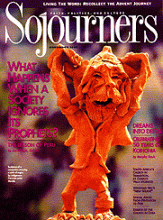Havana, Cuba Last November, a friend invited Odalys Gonzalez to a church-sponsored "discipleship group" getting started in her neighborhood. Gonzalez accepted the invitation in December, and on Christmas she sat with her neighbors during worship in Santa Clara's Methodist Church.
Gonzalez has been a member of the Communist Party of Cuba (PCC) for 11 years. Her entry into a Christian community came on the heels of the decision by the Party's Fourth Congress in October 1991 to admit believers into President Fidel Castro's ruling party. While the historic move has not resulted in an influx of Christians into the ranks of the PCC, hundreds of Party members are now walking in the front door of Cuba's churches.
Until last year, Cuban Communists were required to profess atheism, a requirement born from the heated church-state conflicts of the '60s. The troubled relationship has been on the mend for several years now, with Castro especially displaying increasing openness to dialogue. Last year's decision opened a new chapter in the life of the Cuban church.
The 31-year-old Gonzalez had no previous experience with the church; her parents were practitioners of santeria, a mystical blend of west African and Catholic folk religion. She claims her life is different since accepting Jesus Christ. "I feel at home in the church, it's become my family," she says. She has enrolled in a program leading to baptism and church membership next year.
Gonzalez says local PCC officials have not criticized her church involvement. "They ask me a lot of questions, friendly questions," she says. "They are thirsty for knowledge of God." One fellow party militant loaned Gonzalez a dusty, long-unused family Bible.
Read the Full Article

